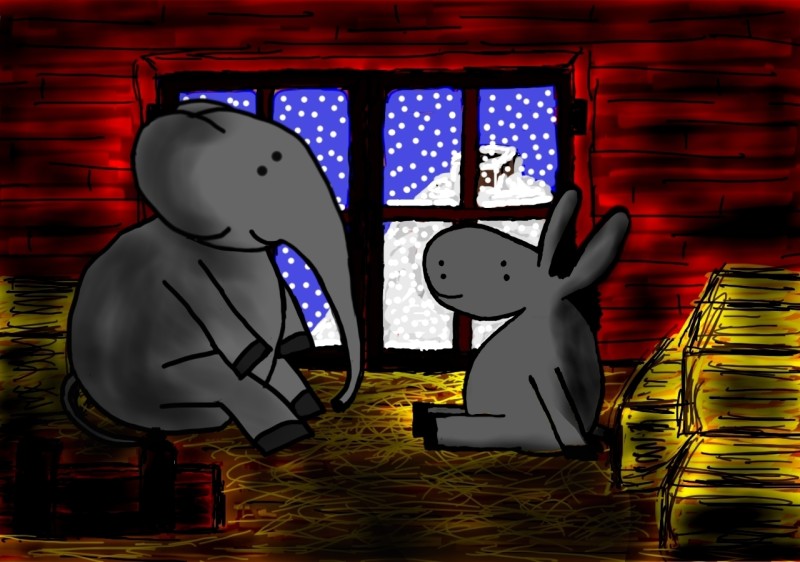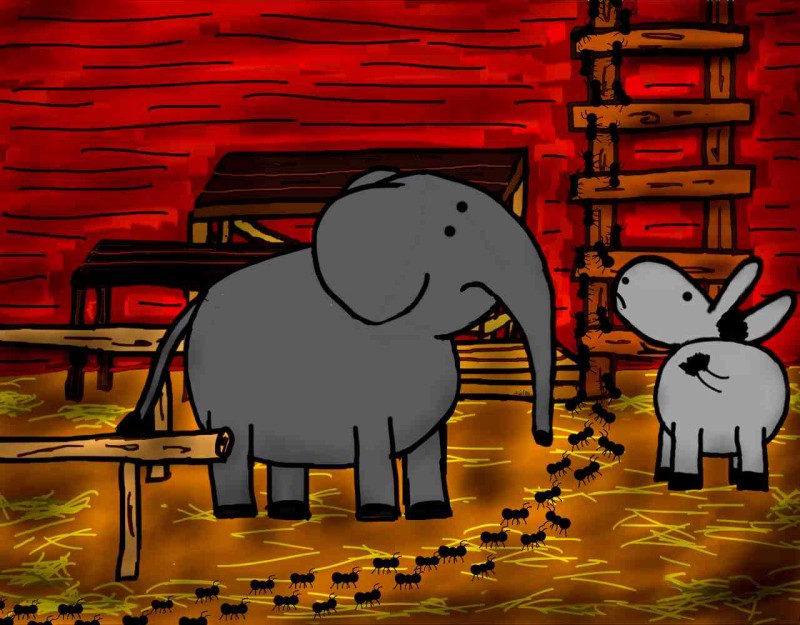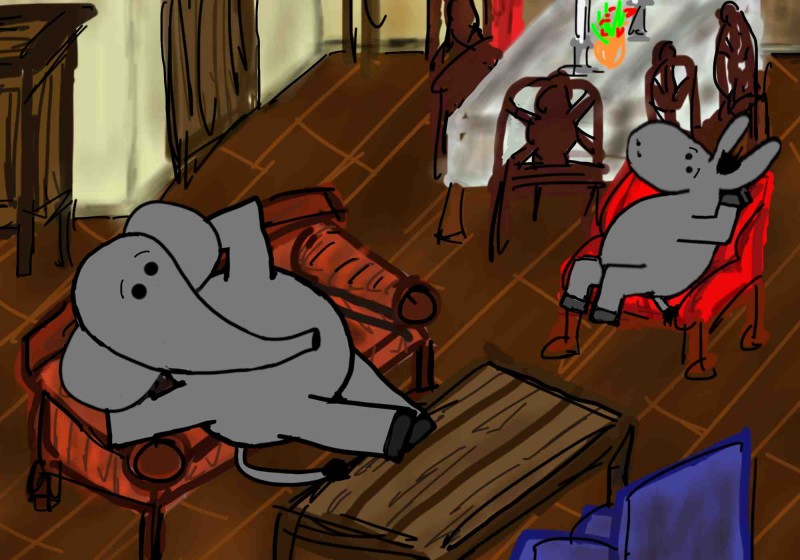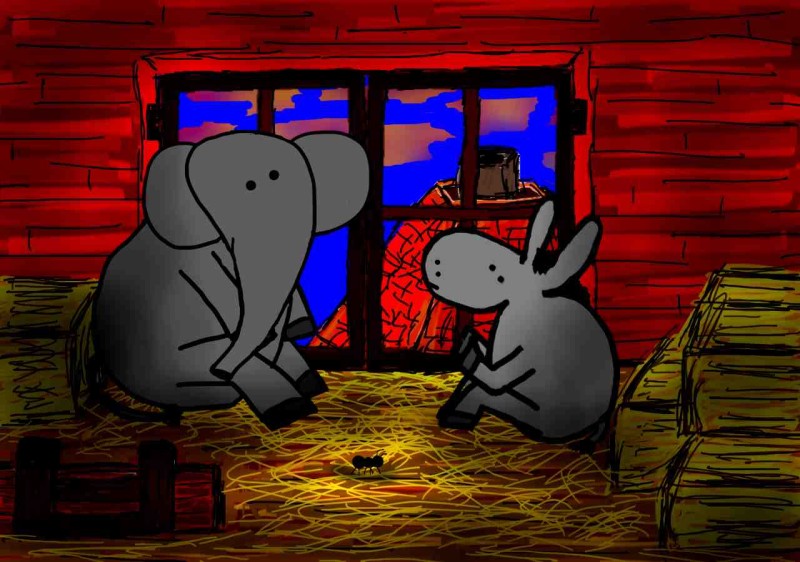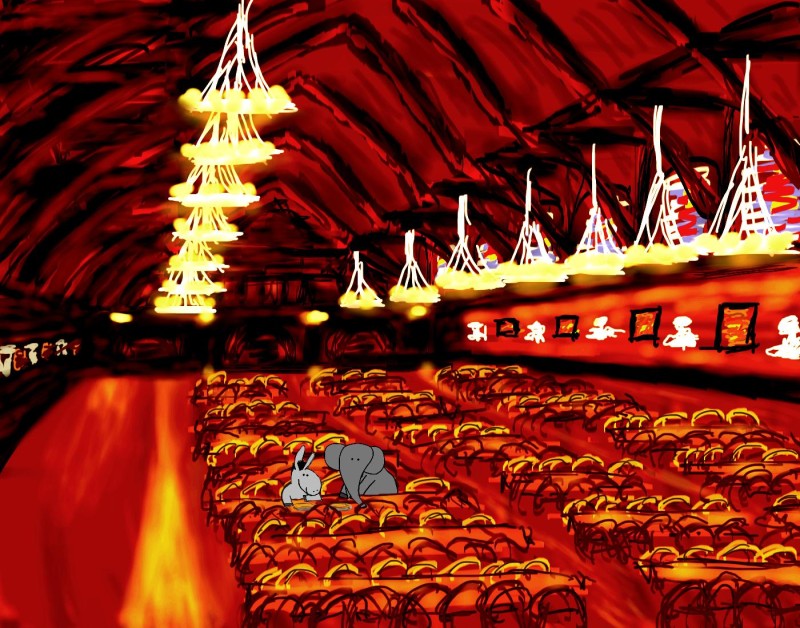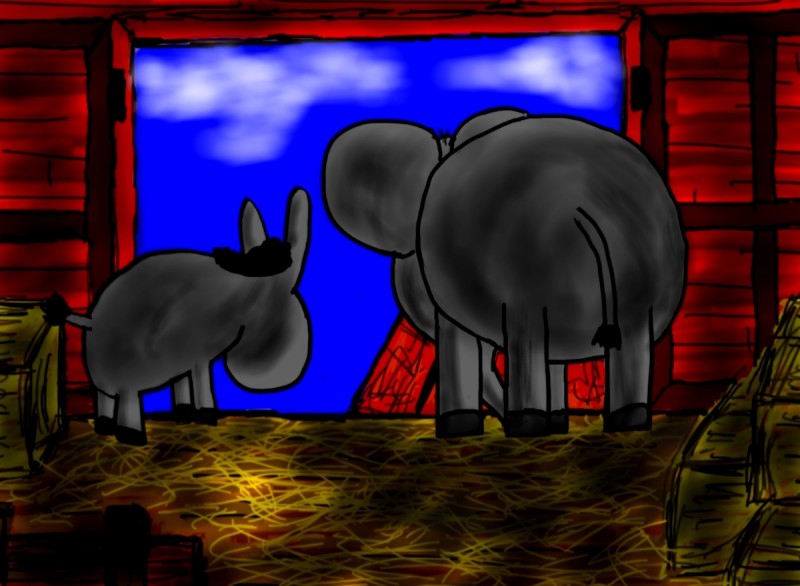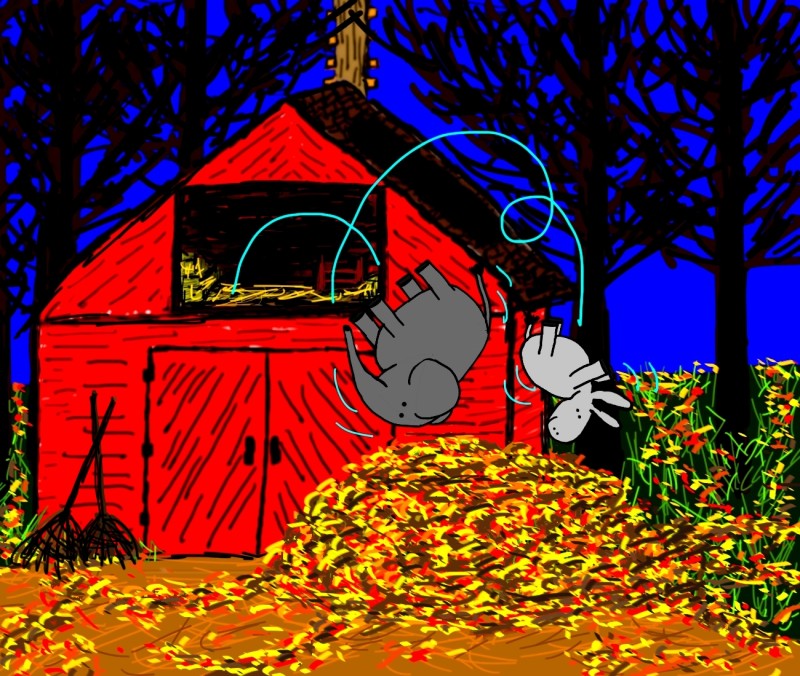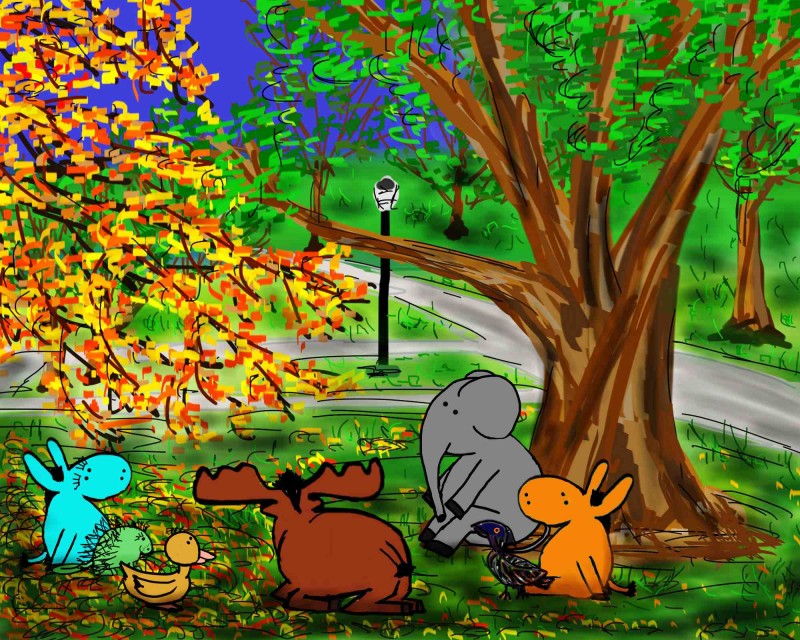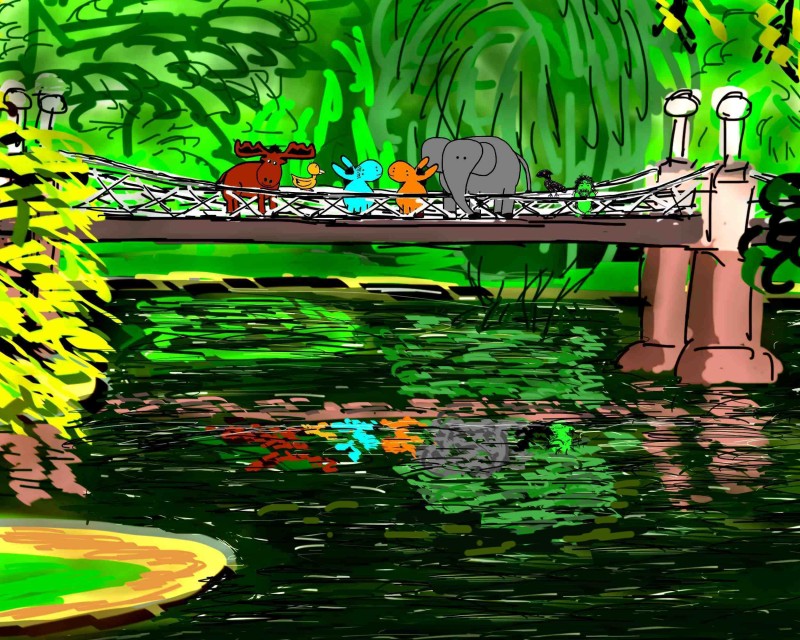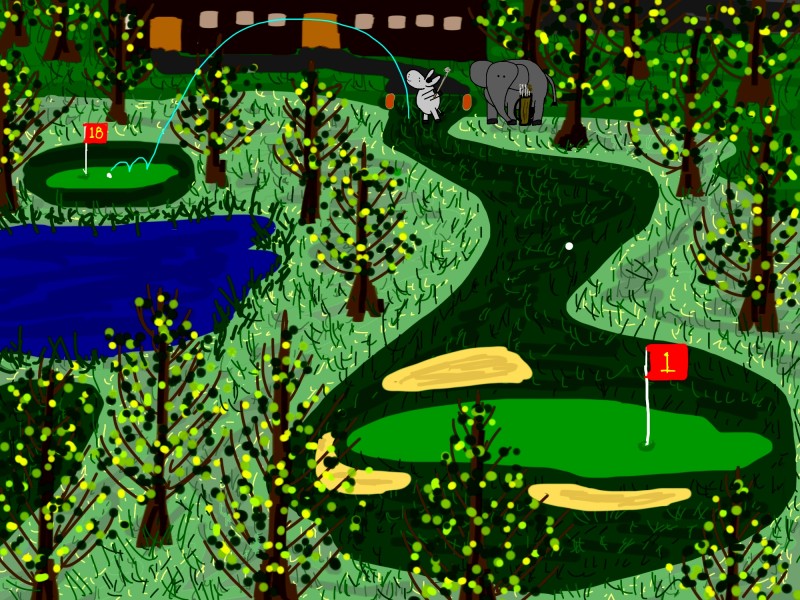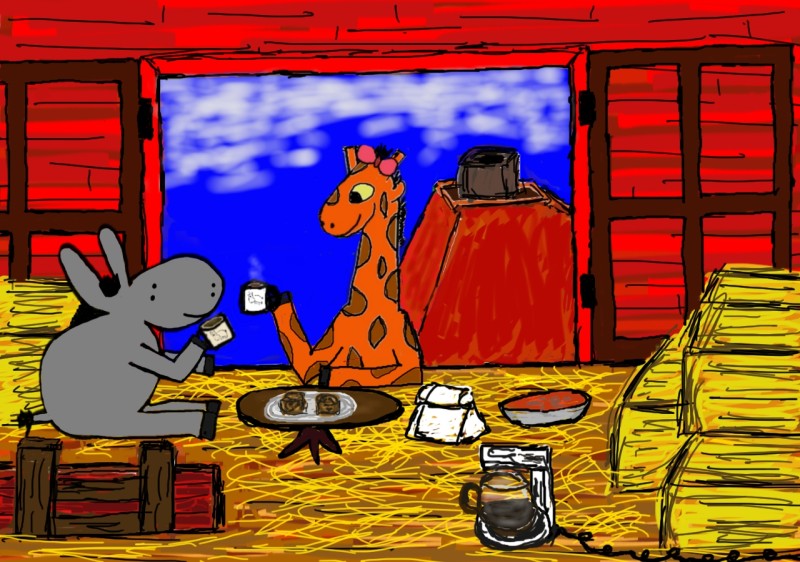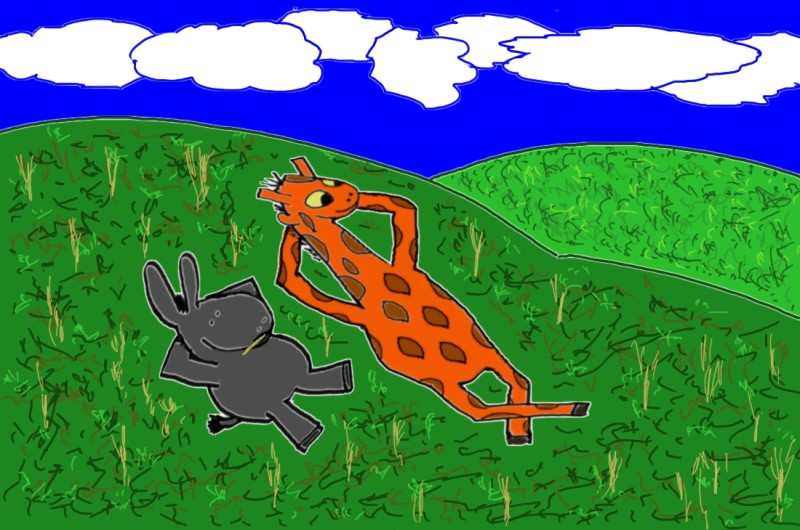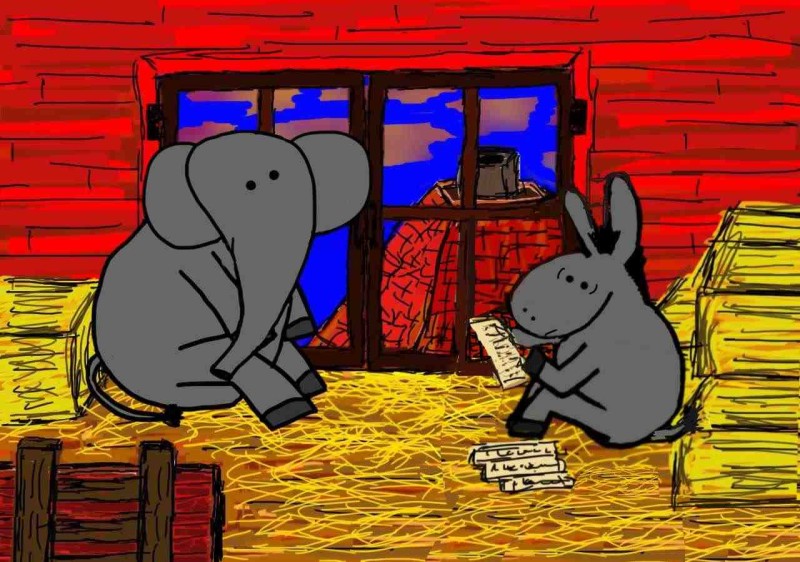It’s nice to be home, said Blurtso. Yes, said Harlan, it is. It’s nice to see our hay again, said Blurtso, and pie tins, and cocoa powder, and Blurtsobarn coffee mugs. Yes, said Harlan. And my painting easel and brushes, said Blurtso, and Patrick O’Brian novels, and “Mister Ed” dvds, and Tony Robbins tapes, and patchwork blanket, and phonograph player and 1970’s LPs, and Cutco knife set, and autographed copy of Leaves of Grass, and French door windows, and step ladder to the loft. We’ve only been gone three days! said Harlan. I know, said Blurtso, but it seems like years.
Tag: elephants
“Blurtso sees an ant” (VIII)
I guess, said Blurtso, he wasn’t a hermit ant.
I miss our barn, said Blurtso. So do I, said Harlan. It’s very unsettling, said Blurtso, when someone invades your home. Yes, said Harlan, you feel violated. What if they don’t leave? said Blurtso. We’ll make them leave, said Harlan. How? said Blurtso. If we turn off the solar heater and open the doors, said Harlan, they’ll get cold and go back to their underground nest. That’s a great idea, said Blurtso. But we’ll have to spend a few days in the house, said Harlan, until we’re sure they’re gone.
“Blurtso sees an ant” (VII)
Oh, oh, said Blurtso, do you see that? Yes, said Harlan. What are we going to do? said Blurtso. I don’t mind a single ant, said Harlan, but when you’re surrounded by hundreds or thousands, they become unpleasant. Do you think he’ll tell his friends about the loft? said Blurtso. I don’t know, said Harlan. Maybe he’s a hermit ant, said Blurtso. A hermit ant? said Harlan. Yes, said Blurtso, an ant who rejects the frenetic pace of contemporary ant traditions and ant society, and goes off on his own to contemplate nature and his relationship to the cosmos. Or maybe, said Harlan, he’s a scout ant.
“Blurtso and Harlan give thanks”
“Blurtso and Harlan rake the leaves”
“Weohryant University” (XIX) – Where 101
Today’s question, said Harlan, is: “Where did it go?”
Where did what go? said Chelsea.
It was here just a minute ago, said Morton.
I didn’t take it, said Emma Lou.
Neither did I, said Frank.
Do you mean “ubi sunt”? said Glouster.
Ubi sunt? said Morton.
“Ubi sunt,” said Glouster, is Latin for “Where are they?” It comes from a Latin poem that begins, “Ubi sunt qui ante nos in mundo fuere?” which translates: “Where are they who, before us, existed in the world?” It was a common theme in medieval poetry, and was most famously expressed by the French poet, François Villon who asked, “Où sont les neiges d’antan?” or “Where are the snows of yesteryear?”
The snows of yesteryear? said Morton.
I don’t like snow, said Chelsea.
Neither do I, said Frank.
I don’t mind it, said Emma Lou, so long as I’m not far from my den.
Why would anyone worry about last year’s snow? said Morton.
It’s a metaphor, said Glouster, for all the things you’ve lost in your life.
Lost? said Chelsea.
Yes, said Glouster, the things you had in the past that you no longer have.
The things I’ve eaten? said Morton.
Yes, said Glouster, and the friends you’ve lost, and your lost youth.
My lost youth? said Chelsea.
Yes, said Glouster.
I’m not going to lose my youth, said Chelsea.
Of course you are, said Glouster.
Really? said Chelsea.
Yes, said Glouster.
In that case, said Chelsea, I don’t like “ubi sunt.”
Crows live forever, said Frank.
They do? said Morton.
Sure, said Frank, crows, or “ravens”, and nightingales, and even some other birds.
Are you sure? said Morton.
Yes, said Frank, just ask Edgar Allen Poe and John Keats.
Who are they? said Chelsea.
They are poets, said Frank, who wrote about birds who live forever, birds who travel from heaven to earth to hell and then back again.
Have you been to heaven and hell? said Chelsea.
No, said Frank, not yet.
I don’t want to go to hell, said Morton.
Heaven and hell, said Glouster, are metaphors for, “the realm of the dead.”
I don’t want to go there either, said Morton.
Maybe, said Chelsea, that’s where the “ubi sunts” are.
I know a song, said Frank, about “ubi sunt.”
What’s it called? said Chelsea.
It’s called “The Ashgrove,” said Frank, and it has a blackbird in it.
How does it go? said Chelsea.
I don’t remember all the words, said Frank, but it’s about a woman who loses her lover and looks for him in an ashgrove.
Does she find him? said Chelsea.
No, said Frank, he’s buried beneath the green turf.
Is that a metaphor for “the realm of the dead”? said Morton.
Yes, said Frank.
Why doesn’t the blackbird, said Chelsea, fly to the realm of the dead, talk to the dead lover, then return and talk to the woman so she can have a sense of closure?
That’s a good question, said Frank.
What’s closure? said Morton.
Closure, said Chelsea, is talking with your ex-lover until you have nothing more to say.
Why would you want to do that? said Morton.
Because, said Chelsea, if you say everything you have to say, you can stop thinking about him when he’s gone.
So he doesn’t become an “ubi sunt”? said Morton.
Yes, said Chelsea.
I would like to be an “ubi sunt”, said Emma Lou.
So would I, said Glouster.
Why? said Chelsea.
Because, said Glouster, I don’t want to be forgotten.
Being forgotten, said Emma Lou, would be like a second death.
Maybe it’s a good thing, said Morton, for people to go around asking “ubi sunt?”
Why? said Chelsea.
Because, said Morton, it keeps the dead from dying.
“Weohryant University” (XVII) – Where 101
Today’s question, said Harlan, is: “Where’s the door?”
The door? said Morton.
What door? said Frank.
There are lots of doors, said Chelsea.
You can’t swing a cat, said Frank, without hitting a door.
Maybe it’s a symbolic door, said Glouster.
An entrance door or an exit door? said Emma Lou.
Why do we want to find it? said Chelsea.
So we can get out, said Morton.
What if there’s no exit? said Frank.
Then we’ll have to stay here, said Morton, until we find it.
Or find an entrance, said Emma Lou.
An entrance? said Morton.
Yes, said Emma Lou, if we can’t get out, maybe we can get in.
Why do we want to go anywhere? said Morton.
That’s a good question, said Glouster.
To see what’s on the other side, said Chelsea.
The other side? said Morton.
Yes, said Chelsea, whenever I see a door, I wonder what’s on the other side.
Even when it says “do not enter”? said Morton.
Yes, said Chelsea, especially then.
Curiosity killed the cat, said Frank.
It did? said Morton.
If that’s true, said Chelsea, why arent’ there dead cats everywhere?
It’s an idiom, said Glouster.
An idiom? said Morton.
An idiom, said Glouster, is “a set expression of two or more words that means something other than the literal meaning of the individual words.”
Idioms, said Emma Lou, often have a basis in reality.
That’s true, said Frank, like the idiom, “There’s more than one way to skin a cat.”
Why would anyone want to skin a cat? said Morton.
It means, said Glouster, “There’s more than one way to do something.”
Or, “Who let the cat out of the bag,” said Frank.
Why would anyone put a cat in a bag? said Chelsea.
Lots of reasons, said Frank.
Like what? said Chelsea.
To stop cats, said Frank, from chasing birds.
Oh, said Chelsea.
I suppose birds aren’t fond of cats, said Morton.
No, said Frank.
What animals do donkeys dislike? said Emma Lou.
We like all animals, said Chelsea.
Except dogs, said Morton, when they’re nipping and yapping at your heels.
That’s true, said Chelsea, but some dogs are nice.
I don’t like crocodiles and alligators, said Glouster, they remind me of U-boats.
What’s a U-boat? said Chelsea.
A U-boat, said Glouster, is a submarine. The name comes from the anglicized version of the German word, “U-boot,” which comes from the word “Unterseeboot,” which means “under sea boat.” In World War II German U-boats plundered U.S. and Canadian merchant ships carrying supplies to allies in Western Europe.
I hate war, said Chelsea.
How does a submarine go under the sea, said Morton, without water leaking through the doors.
The doors, said Glouster, are air-tight. Nothing can get in or out.
There’s no exit? said Frank.
Not as long as the U-boat is underwater, said Glouster.
I don’t like to be trapped in closed spaces, said Frank.
Nor do I, said Glouster.
I don’t mind, said Emma Lou, as long as I can dig my way out.
“When one door closes,” said Glouster, “another one opens.”
Is that true? said Morton.
It’s an idiom, said Glouster, that means “When one opportunity is lost, another one presents itself.”
I’ve been in a barn, said Morton, that had two doors which were both closed.
What did you do? said Frank.
I stopped thinking about getting out, said Morton, and started thinking about something else.
You opened a door in your mind, said Emma Lou.
That’s right, said Morton.
Maybe that’s the door we should be looking for, said Frank.
The door in our mind? said Morton.
Yes, said Emma Lou, the door to imagination, to new perspectives, possibilities, and opinions.
I use that door all the time, said Chelsea.
It’s a very nice door, said Morton.
And it’s almost always open, said Emma Lou.
Almost? said Chelsea.
Yes, said Emma Lou, sometimes it’s closed by habits and prejudices we’ve adopted from those around us.
A Scottish journalist named Charles Mackay, said Glouster, wrote a book called, Extraordinary Popular Delusions and the Madness of Crowds.
What’s it about? said Chelsea.
It’s a book about crowd psychology, said Glouster, and how individual delusion can become mass delusion.
Mass delusion, said Emma Lou, is called “reality.”
How can you tell, said Morton, if what you believe is a delusion?
That’s a good question, said Chelsea.
What’s the answer? said Frank.
I don’t know, said Morton, maybe that’s the door we should be looking for.
“Blurtso plays a quick round of golf”
“Blurtso misses the revolution”
“Weohryant University” (IX)
Teaching is a tremendous responsibility, said Blurtso. Yes it is, said Harlan. What if I’m no good at it? said Blurtso. You’ll be fine, said Harlan. What if my students ask questions I can’t answer? Then tell them you don’t know, said Harlan. Can I do that? said Blurtso. Of course, said Harlan. I thought a teacher was supposed to know all the answers, said Blurtso. No, said Harlan, a teacher is supposed to know the questions. The questions? said Blurtso. Yes, said Harlan, the questions are more important than the answers. They are? said Blurtso. Certainly, said Harlan. Why? said Blurtso. Because many questions, said Harlan, have many answers, and others have no answer at all. So all I have to do is ask questions? said Blurtso. Yes, said Harlan. What kind of questions? Good questions, said Harlan, questions that make your students consider things they’ve never considered. How do I do that? said Blurtso. It’s easy, said Harlan, just do what you’re doing right now. What I’m doing right now? said Blurtso. Yes, said Harlan, asking questions.
